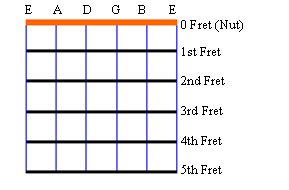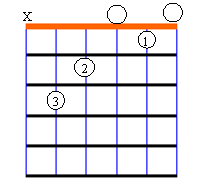How to Play Guitar Chords
While playing chords may not on the surface seem as impressive as fancy guitar solos and riffs, all accomplished lead guitar players will be expert at playing guitar chords. Basically if you learn how to play guitar chords you on your own can produce a very pleasant tune. If you can sing as well, then you can give a performance. Bob Dylan wasn’t known for blistering guitar solos but he played to millions.
Click Here for Guitar Superstars
Chords are produced by strumming at least three strings simultaneously and whilst there are many chords that can be produced on the guitar, there are five basic chord patterns that you should learn the major and minor versions of. These are C, A, G, E and D and this is often referred to as the ‘CAGED’ system. Below you will see some chord charts which will teach you the CAGED system. This will provide a very sound basis for your further development.
First you must learn to read the chord chart and this diagram shows you how we will represent the frets and the strings.
On the chord diagram we will place numbers which will show you what finger you should place on what fret. Your fingers are numbered as number 1 being the index finger through to number 4 being your small finger (pinkie).
So let’s look at the first one, C major:
This diagram shows that your first finger frets the B string over the first fret, your second finger frets the D string over the second fret and your third finger frets the A string over the third fret. The X on the first E string indicates you do not strum this string and an O indicates that the string is open i.e. it is not fretted. This convention will be used from here on in for the major and minor CAGED system to show you how to learn how to play guitar chords.
|
Learn How To Play The Guitar
Copyright 2010
guitartrainingbuddy.com
Note: The owner of this site is an
affiliate of the products
promoted.
www.guitartrainingbuddy.com



